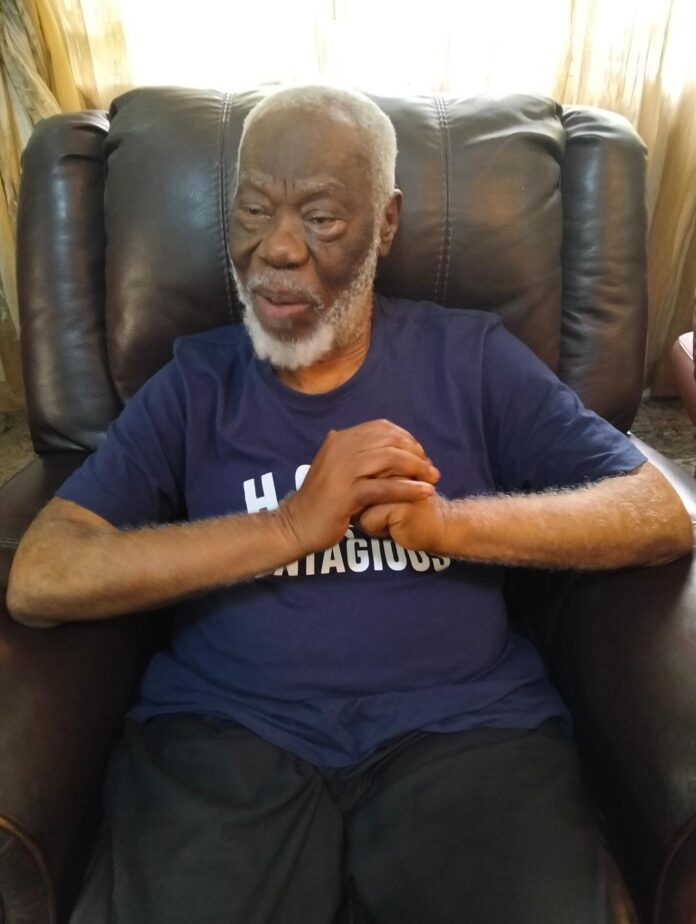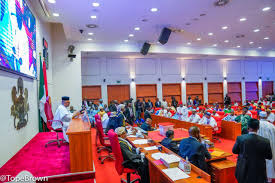Nigeria’s problem is not writing a new constitution – Dr. Uma Eleazu
- Says the problem is in having the values that will maintain institutions of state ingrained in leaders
On Sunday, June 16, elder statesman, Dr. Uma Eleazu, marked his 94th birthday. Two months after, he sat down with IKECHUKWU AMAECHI for an exclusive interview.
At 94 years, Dr. Eleazu, an economist, political scientist and administrator par excellence, has seen it all, having been everything, literally, since joining the civil service of Nigeria in 1956 as a clerk. An academic, he was a lecturer in both Nigeria and the United States.
He oversaw the setting up of the Public Complaints Commission in 1973 and also the National Institute for Policy and Strategic Studies (NIPSS) between 1975 and 78.
He was a member of the committees that wrote both the 1979 and 1999 constitutions. He once headed the Manufacturers Association of Nigeria (MAN), as well as facilitated the creation of the manufacturers associations in Kenya and Uganda.
Elder Eleazu consulted for both the United Nations Development Programme (UNDP) and United Nations Industrial Development Organisation (UNIDO). He once headed the Pipelines and Products Marketing Company (PPMC).
Today, Dr. Eleazu is the chairman, Board of Trustees of Anya-Ndi-Igbo, a non-partisan, socio-political and economic development-oriented organisation, committed to equity, peace, unity, justice and progress of Nigeria.
But despite all these glittering feats, he is distraught that Nigeria is grossly underperforming.
“I didn’t believe that I will be alive to see Nigeria drop to the level where we are now,” he agonises. “This country is not what I expected it to be after more than 60 years of independence.”
Elder Eleazu, a 1993 presidential aspirant on the platform of the Social Democratic Party (SDP), insists that what is going on in Nigeria today epitomizes the Hobbesian state of nature.
“We have almost rubbished everything and we now live in what Hobbes would call a state of nature in Nigeria – war of all against all where one can leave his house in the morning without being sure that he will return. He can be abducted in the middle of the road and that’s it and people will start negotiating. It is a new kind of slave trade.”
The Patriots, a group of eminent statesmen, chaired by elder statesman and former Commonwealth Secretary General, Chief Emeka Anyaoku, believes that the problem lies in the defective 1999 constitution, and has called for a new constitution.
To advance this cause, the group in August inaugurated an advocacy committee led by Prof. Anthony Kila, a prominent political economist and professor of strategy and development, after meeting with President Bola Tinubu to advocate for a new constitution.
Anyaoku argues that even the best leaders would struggle to address Nigeria’s significant challenges under the existing constitution.
Dr. Eleazu agrees that a new constitution is needed but he does not see it as the solution to Nigeria’s daunting problems.
“Some of us think that the problem is not writing a new constitution or making a law. The problem is in having the values that will maintain such institutions ingrained in those who are going to participate.
“In societies that are stable, their values will be inherent in the institutions that they have. And as long as the institutions maintain those values, the society itself will be stable.
“What has happened in Nigeria is that the traditional institutions have been destabilised by colonialism. We now borrowed the institutions of democracy or modern government. If you want democracy, it goes with representative government, it goes with responsible government.
“Unfortunately, the people who lead in these institutions here are not responsible, are not effective, have no integrity to maintain the integrity of the institutions, and that is what has gone wrong.”
“Writing a constitution is easy,” he further says. “You can get a body of lawyers, political scientists, economists, scholars and they will write a constitution for a country. But those who are going to write a constitution must know first of all what the people believe in, what values they hold dear and if they agreed to be under a constitution. Most constitutions begin with the phrase, “We the people.” So, the first thing is to know who the “we” are.”
Speaking specifically about the assertion by The Patriots chairman that even the best leaders would struggle to address Nigeria’s significant challenges under the existing constitution, Dr Uma Eleazu said: “Yes, I heard His Excellency Chief Emeka Anyaoku say that. My view is that you can have good people, that is people with integrity, people with the right kind of education, people with the right kind of attitude, and they will use this same 1999 constitution and run Nigeria well.
“So, my own take on the issue is that it is not what you write in the constitution, it is what the people who are upholding the constitution, and how they interpret the words of the constitution and operate it that matters. That is what gives any country the stability.”
Dr. Uma Eleazu believes there is no subsidy contrary to the claims of President Bola Tinubu.
“I am one of those who believe that there was no subsidy in the first place. They were just using the bogey of subsidy to siphon money from the NNPC.
“I was chairman of what they call Price Products Marketing Company (PPMC), which was a subsidiary of NNPC. And I know for certain that if our refineries are working, there will be no subsidy. You just put the transportation on it to take from the refinery or the depots.
“In addition, there were pipelines from the refinery on the eastern flank to Aba, where we had the biggest depot; from Aba to Makurdi, where we had another big depot, then from there it goes up north. Even from the Atlas Cove, the pipelines were there.
“But they didn’t use the pipelines when they were refining here. Instead, there was one big man, I don’t know if I should mention the name, who had a fleet of trucks and the NNPC was paying him bridging cost for trucking the products that should have gone through the pipelines.
“So, instead of allowing the petrol to go through the pipelines, he will come to Aba or to Atlas Cove with many of his trucks and truck to the north. Then we discovered that he doesn’t sell the thing to the petrol stations in the north. Much of it ends in Niger Republic. You can quote me in this one.”
Keep a date with TheNiche on Thursday, September 12, 2024 for the full interview. Visit www.thenicheng.com. You will be glad you did.
It is an interview like no other.













